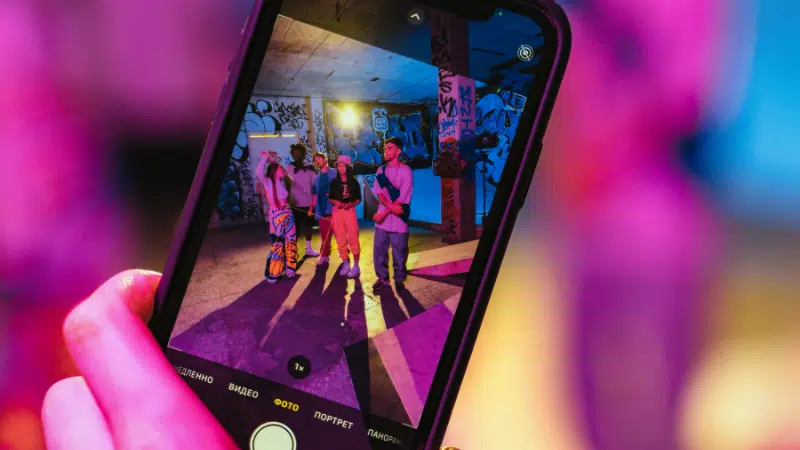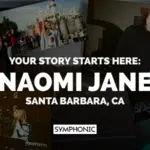Social media can be a double-edged sword. On one hand, it gives you a direct line of connection to your fans, a platform where you can share your work, and the chance to build a loving community around your art form. On the other hand, it can be a confidence killer, energy drainer, and a negative influence on your mental health if you aren’t careful. Between the pressure to stay relevant, the endless scrolling of people’s best moments, and the chase for likes and shares, it’s easy to feel overwhelmed. That’s why it’s so important to set boundaries and protect your mental health when you’re online.
If you’re looking to foster a healthier relationship with your social media usage, I get it. (You and me both.) Here’s everything you need to know to create a relationship with social media that benefits your artistry, not takes away from it. Let’s dive in…
How to Protect Your Mental Health on Social Media as an Artist
Comparison, Imposter Syndrome, and Validation Loops
Social media puts both your work and life on full display, and that comes with a whole set of emotional challenges. Seeing other artists’ highlight reels can make your own journey seem smaller, less worthy, even. That’s the comparison trap in full swing. The constant measuring of your own success vs everyone else’s best moments.
This comparison fuels what we call impostor syndrome, that nagging feeling that you aren’t good enough, don’t deserve the success you’ve earned, or that you’re an impostor faking your way up. Even if you’re killing it, doing the best you ever have, imposter syndrome tells you that you’re not as talented as you think.
Not only that, but then there’s the validation cycle. Chasing likes, comments, and shares to feel seen and valued. It’s easy to get hooked on these digital affirmations, but relying on them for your own self-worth is the last thing you want to do. You aren’t alone in feeling this way. And understanding these patterns is the first step to breaking free of these self-imposed limitations.
From there, it’s all about shifting your approach and posting with intention, not obligation. How can you do this? The next step is getting intentional about how and why you show up online in the first place.
Intentional Posting vs. Chasing Engagement
Before you post, ask yourself one simple question… “Why am I sharing this?” Is it because you genuinely want to express something, or are you just looking for validation in the form of likes? (Too real? 😆)
There’s nothing wrong with wanting engagement, but when your creative choices start to revolve around what will perform best instead of what feels real to you, that’s when it starts to feed into an unhealthy cycle. Now, algorithms are always changing. What is sustainable, though, is staying true to your “why”. Whether that’s to connect with your community, to document your journey, or to share something you’re proud of, be honest with yourself about your purpose. Then, let that guide you with what you post.
When your intent on socials is aligned with your values (not just numbers), you’ll find social media as a whole feels a lot less draining and a lot more meaningful.
Setting Boundaries: Time Limits, Mute/Block Features, & Posting Schedules
Let’s pull back the curtain a little… Social media was designed to keep you scrolling. But you don’t have to be online 24/7 to build a strong presence online. To be real, the more intentional your usage is, the better it tends to feel.
You can start by setting time limits with built-in screen time tools or just committing to no-scroll mornings and phone-free nights by sheer willpower alone. No matter how you want to do it, that time away from your screen gives your brain room to breathe. Don’t be afraid to use mute and block features liberally. If a certain account makes you feel anxious or less-than, even if it’s another artist you respect, it’s okay to hit mute for a while. Protecting your peace is more important than being overly plugged in.
And if posting is starting to feel overwhelming, try adjusting your posting schedule to something more laid-back. Take some time to carve out a dedicated time once or twice a week to create and post content. You don’t have to go hard all the time; you can change your pace depending on how you feel. Contrary to popular belief, boundaries aren’t barriers; they’re support systems.
💡 PRO TIP: And if you don’t have a content calendar set up for yourself… you’re making life way harder for yourself than it needs to be! // Check out this post to learn how to make a content calendar that works for you.
——
📚 Want more? Check out these helpful resources…
How To Use User-Generated Content To Market Your Music
Why Real Music Marketing is More Than Just Promotion… It’s Strategy
Smart Budgeting Basics for Indie Labels That Actually Work
Mental Health Resources for Musicians in 2025
How To Reframe Negative Thinking Patterns
——
How To Create a Healthy Feed
You have way more control over your feed than you think. If scrolling feels like a constant reminder of what you’re not doing or where you aren’t at yet in your career, it may be time to cut down on what (and who) you’re following.
While you scroll, ask yourself, “How does this content make me feel?” If someone’s posts always leave you feeling inspired, motivated, or educated in some way, that’s exactly what you want! If not, consider muting, unfollowing, or taking a break from them. No hard feelings; you’re allowed to make your digital space exactly how you want it.
This also goes for suggested posts. Most platforms serve you content from people you don’t even follow, and that noise adds up fast. Snoozing suggested posts (which you can do on most apps) can make a huge difference. I personally snooze my suggested posts on IG every month. It keeps my feed focused, intentional, and way less overwhelming.
Realistically, you should be following creators who share your spark for music, speak openly about their creative process, or offer helpful insights or inspiration. Mix that with content that makes you laugh, brings you joy, and fuels your fire, and your feed will be one that gives you energy, not drains it. Just like you wouldn’t surround yourself with negative energy or people in real life, you should treat your online space the same.
Vanity Metrics vs. Actual Value
Not every post needs to ‘perform’. Likes, views, and follower counts all look impressive, but they don’t always reflect real connection… or real growth, for that matter. That’s the difference between vanity metrics and actual value.
Instead of fixating on numbers, shift your focus to what’s happening behind them. Did someone message you about how your song made them feel? Did your post help express something meaningful that matters to you? This kind of impact doesn’t always show up in numbers and analytics, but it matters more than you think. At the end of the day, your worth as an artist isn’t defined by metrics. It’s defined by the music you create, the people you reach, and the energy you share as an artist.
💡 PRO TIP: If you’re feeling discouraged by low numbers, look through positive past comments, DMs, or moments of feedback that remind you why you do this in the first place. Screenshot them. Save them in a folder. Revisit them when the numbers get overwhelming.
Now, THAT is real impact. No algorithm needed. ♡
When to Take a Digital Detox
Even with good boundaries and even better intentions, sometimes you just need a break. And that’s ok! If social media starts to feel more draining than inspiring, it may be time for a digital detox.
No need to Frank Ocean it and disappear forever. A detox can look like deleting the app for a weekend, logging out for a week, or just taking a break from posting while you work behind the scenes. The point is to step back, reset, and reconnect with yourself and the things that inspire you the most.
While you take this break, fill that space with things that fuel your fire. Go for a walk, touch some grass, talk to your most whimsical music friends, whatever brings you the most joy and makes you feel creative, inspired, and recharged. The goal isn’t to just unplug and stare at the wall. It’s to reconnect with the parts of yourself and your art that get drowned out by the noise of the internet.
And whenever you’re ready, you can get back to the grind more inspired than ever.
To wrap things up…
Social media will always be a part of the artist’s journey. If you want to make it in this industry, that’s the reality of having a career in music. That said, that doesn’t mean your mental health has to suffer at the whim of the corporate machine. By being self-aware of what’s working for you and what isn’t, setting clear boundaries, and focusing on real connection over the dreaded numbers game, social media can be a tool that works for you, not against you.
Gone are the days of the tortured poet. Now, we have the tools to protect our peace, honor the creative process, and curate the media we consume in a way that feeds your art and leaves you wanting more. Social media is just another way to share your story, connect with the fans who mean the most, and let your artistry speak for itself.
As always, good luck!



